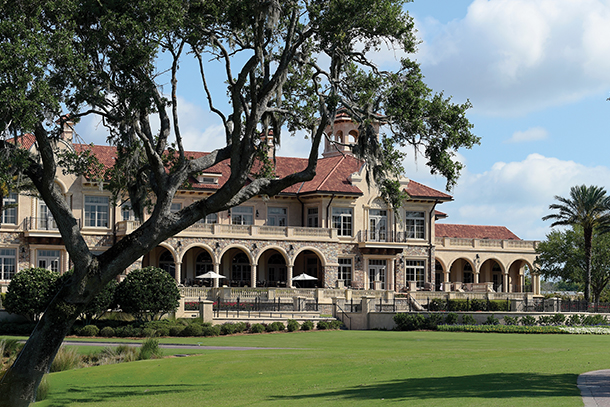
Hole 11 at Victoria National in Indiana
Sports
A Look at Exclusive Golf Network Memberships
by Shaun Tolson

Dormie Network’s ArborLinks in Nebraska

The interior of the ArborLinks Owners Cottage

Ballyhack Golf Club in Virginia

A typical steak lunch at ArborLinks
Dormie Network
To be dormie in golf is a good thing, so long as you’re the one who is up in the match. And it’s great if you’re ahead by as many holes as remain to be played. Because then not only are you winning, but you’re also guaranteed not to lose.Another sure-win proposition is the Dormie Network (dormienetwork.com)—a portfolio of six private golf clubs (with a seventh on the way) included in a single membership. The network was founded in 2018 by Zach Peed, a savvy entrepreneur, former collegiate golfer, and, most importantly, a discerning golf enthusiast who saw a deficiency in the private golf marketplace. He observed that even though some prestigious clubs excelled at certain things—exceptional on-course experiences and high-quality golf, for example—very few delivered equally high-quality member experiences across the entire spectrum of club life. He also recognized that the most discerning and affluent golfers often supplemented their home club membership with memberships at several national clubs.
It only made sense that there would be high demand for a network of private, national golf clubs. When Peed discovered that such a network didn’t exist, he set out to build it himself, starting with the acquisition of ArborLinks in Nebraska. The purchase of Ballyhack Golf Club in Virginia, Briggs Ranch Golf Club in San Antonio, and the Dormie Club in North Carolina soon followed. Across four years, Peed purchased six golf clubs, the last of which was Hidden Creek in New Jersey.
Currently, a seventh club, GrayBull in Nebraska, is under construction and scheduled to open later this year. Looking ahead, the network has plans for steady growth; it’s possible that future additions will be similarly built from the ground up, since Dormie Network has exacting requirements for the properties that it brings into the fold. “We’re fishing from a very small pond,” says Chris Graham, Dormie Network’s chief hospitality officer, who explains that quality golf comes first, but it must also offer room to expand and flexibility to build accommodations and other amenities. “It’s often difficult to find high-quality golf with land not developed around it. We’re built on three pillars: a pure golf experience, well-appointed accommodations, and a focus on food and beverage with inspired cuisine.”
Most clubs within the network feature around 15 four-bedroom cottages, so only 60 members can utilize the club at any one time. That creates an intimate stay, which Dormie is committed to pairing with a distinct experience. “They’re all going to feel different because, aesthetically, the terrain is different,” Graham says of each club. “Everything looks different. We allow our food and beverage teams to really go [in the direction of] more regionally inspired cuisine.” Hidden Creek, just east of Atlantic City, for example, leans heavily on coastal influences and seafood, whereas menus at ArborLinks in Nebraska emphasize farms and ranches with steakhouse-inspired fare.
Graham acknowledges that the majority of Dormie Network members live more than 100 miles away from the network’s nearest club, thus belonging to at least one other private club where they play most of their golf. When they’re staying at a Dormie Network club, members are either escaping their daily lives or wining and dining corporate VIPs. “Either you’re on vacation or you’re there entertaining business clients,” Graham says. “You want to have a hell of a time and we’re there to provide it.”
Dormie Network has created a unique membership model for exclusive golf, while adjacent entities have developed various structures to be able to offer their own versions of accessibility to multiple private clubs.

TCP Network’s Sawgrass Clubhouse in Ponte Vedra Beach, Florida

TPC’s Danzante Bay course
TPC Network
The notoriety of the TPC Network (tpc.com) has everything to do with the prestigious golf clubs that flaunt the TPC badge and—in many cases—host an annual championship on the PGA Tour. After all, the network was created by the PGA Tour back in the 1980s, and more than half of the clubs within it are owned or managed by the Tour (the remaining clubs are licensed TPC properties).As alluring experiences are concerned, a round on the Stadium Course at TPC Sawgrass, host of The Players Championship and home to the world’s most famous island green, is high atop most avid golfers’ bucket lists. A round played on the Stadium Course at TPC Scottsdale, the yearly venue of the WM Phoenix Open, is desired for many of the same reasons. And then there’s TPC Harding Park, a recent host of the PGA Championship and a scenic gem punctuated by towering Monterey cypress trees and views across the Bay Area’s Lake Merced.
Depending on the TPC club, initiation fees range from about $12,500 up to as much as $125,000 and annual dues typically start just under $10,000 and peak at about $16,000. All full golf memberships include entry into the TPC Network’s reciprocal program, TPC Passport, which offers full-golf members six visits per year to each of the other 29 clubs within the TPC Network, about half of which are private (the remaining clubs operate as high-end resorts). Additionally, reciprocal access exists at 30 golf resorts across Europe and Asia that are affiliated with the DP World Tour. For playing privileges at private clubs, TPC Passport members are only charged a cart fee; when golfers book tee times at any of the TPC resort properties, they’re offered a 20-percent discount.
“People are sometimes pleasantly surprised to realize that we’ve got a little bit of everything,” says Victor Aliprando, senior vice president of TPC Network operations. And while he acknowledges that the TPC Passport program is straightforward—even though it serves as an exclusive service only for booking tee times—the PGA Tour is always brainstorming how the program can evolve. “We think it would be pretty exciting to offer golf trips to different parts of the world or even different types of experiences, whether it’s wine tours or ski trips,” he says. “But we haven’t gotten there yet.”

Invited Clubs’ Firestone course
Invited Clubs
Much like the TPC Network, Invited Clubs (invitedclubs.com), formerly known as ClubCorp, has managed a reciprocity program for decades. Now called XLife, the program is an optional, incrementally priced add-on for members of an Invited club, which offers different tiers of access based upon the level of club that a member joins. Membership in the most elite level of clubs (what Invited calls its Premier Collection) includes full-member access at 160 clubs within the company’s network, as well as playing privileges at another 250 clubs around the world for a nominal cart fee. The top level of XLife also offers members a 50-percent discount on food and beverages at their home club and a 25-percent discount at most other clubs within the network.As Invited CEO David Pillsbury likes to say, the program is akin to “reciprocity on steroids.” The most surprising thing, in his opinion, is how secretive the program seems to be. “When it comes to reciprocity, we are the Cadillac that nobody knows about,” he declares. “I’m amazed at how little this is talked about because it’s such a powerful benefit, especially to Premier members.”
Invited plans to begin organizing exclusive events at some of the 42 total Premier-level clubs, which will only be accessible to those top-level XLife members. “It’s just going to add more value,” Pillsbury says, “and more allure.”




